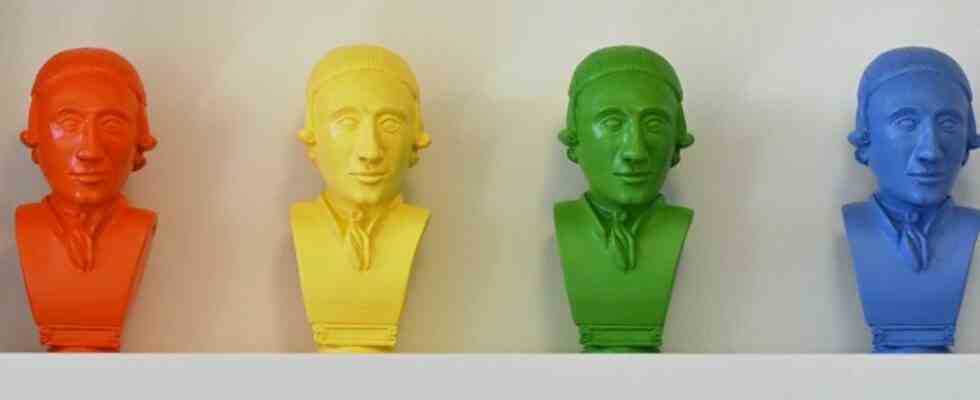Weimar classic
New exhibition opened in the Wieland Museum
Colored miniatures of Wieland busts in the museum shop. photo
© Martin Schutt/dpa
The city of Weimar is associated by many with Schiller and Goethe. But the writer Christoph Martin Wieland is also a child of the region. He arrived in the city 250 years ago – not the only reason to celebrate.
Together with Minister of State for Culture Claudia Roth (Green Party) and Thuringia’s Prime Minister Bodo Ramelow (Left Party), the newly designed museum dedicated to the writer Christoph Martin Wieland (1733-1813) was officially opened in Oßmannstedt near Weimar on Friday. The occasion was the 250th anniversary of the writer’s arrival in Weimar.
The show “Germany’s First Writer” takes a look at Wieland in the historical living quarters of his manor house as a novelist, as a political journalist, as a chronicler of the French Revolution and as a translator.
Even if Wieland is one of the most important writers of the 18th century, he is less well known than his immediate neighbors. Johann Wolfgang von Goethe (1749-1832) and Friedrich Schiller (1759-1805) are far more famous former residents of Weimar.
At the opening ceremony, the Minister of State for Culture admitted to a large audience that she had recently familiarized herself with Wieland’s literature and history. “It wasn’t school literature,” Roth said apologetically. The exhibition and the book by the literary scholar and Wieland expert Jan Philipp Reemtsma, who played a key role in the redesign, gave her exciting insights.
Power and beauty of the German language
The philosophy professor Wieland came to Weimar in 1772 to teach. Duchess Anna Amalia had called him to court primarily to educate the hereditary prince. The writer, playwright, translator and publicist Wieland lived and worked in the village of Ossmannstedt – about ten kilometers east of Weimar – from 1797 to 1803.
With the redesign of the permanent exhibition, the Klassik Stiftung Weimar is once again more effectively pursuing its “institutional responsibility for a creative and possibly controversial communication” of the power and beauty of the German language, said the President of the Foundation, Ulrike Lorenz. Wieland could be a role model here.
On Saturday, the Klassik Stiftung Weimar will again open the gates of the manor house in Oßmannstedt to the general public. Then hikers, cyclists and Wieland enthusiasts are welcome again in the newly designed foyer.

